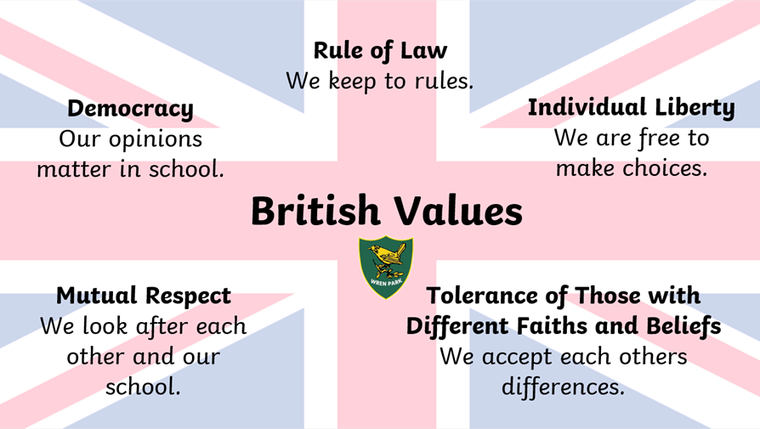British Values
British Values
Why is British values part of the responsibility for school to teach?
In 2011 the government set out its definition of British Values and in 2014 these values were re-iterated. The DFE state that schools must demonstrate how they are ‘actively promoting’ these values.
This requirement goes hand in hand with the legislation introduced which places additional responsibility on Schools to prevent children from becoming radicalised (the Prevent Duty).
Prevent Duty –What are the aims of this?
- To safeguard people from becoming terrorists or supporting terrorism.
- Building resilience to radicalisation.
Recent trends, hate crime, Self-initiated terrorists (inspiring would be attackers through ideologies and extremist media).
In our recent inspection OFSTED identified one of our “Areas for Improvement” to be British Values. Whilst we are confident that this area is covered we have a renewed focus to ensure this is taught well and understood by all children. We hope that through our work the children will be able to articulate these values and their impact within their own lives.
What are the British Values?
- Democracy
- Rule of law
- Individual liberty
- Mutual respect and tolerance for those with different faiths and beliefs
These values are complimented by and contributing to our school values of:
“RESPECTFUL, AMBITIOUS, RESILIENT”

Democracy
Our school council / parliament is an excellent representation of democracy at a school level. Children are elected to represent the pupil voice and through school and Eco- council. Council leaders meet with members of the SLT to discuss improvements and how staff, students and the community can work together. On occasions other “working parties” perform roles which involve pupil voice and the principles of democracy. They understand the electoral system, voting and the idea of consensus. The school Council have established links to decision making at governor level on certain issues and areas of focus.
The Rule of Law
Everybody is subject to laws and rules. Wren Park is no different. What is essential for children is that they understand why there are laws and rules. Linking with respect and inclusion rules provide the basic expectations everyone should meet. Rules both written and unwritten are understood as being essential for the safety, security, fairness and well-being. Consequences of not following rules are known and understood. Where rules break down or are not followed reflection, consequences and improvements are considered as essential areas for continual improvement. The Behaviour Policy reminds children that breaking rules may have an impact upon others and consequences for themselves.
Individual Liberty
Within school, children are actively encouraged to make choices, knowing that they are in a safe and supportive environment. As a school we educate and provide boundaries for young pupils to make choices safely, through the provision of a safe environment and empowering education. Pupils are encouraged to know, understand and exercise their rights and personal freedoms and advised how to exercise these safely, for example through our E-Safety, assemblies. Whether it be through choice of challenge within the curriculum, of participation in our numerous extra-curricular clubs and opportunities, pupils are given the freedom to make choices.
Also, through the curriculum students learn to understand the importance of liberty e.g. in History about Civil Rights, Slavery and the Suffragette Movement. Also, in RE students learn about religious freedoms in the UK. In PSHE children learn about their rights and responsibilities under laws such as Health & Safety, Freedom of Information, Copyright and Consumer Protection Act.
Mutual Respect
Wren Park children are encouraged and expected to respect each others views and the views of others. This is achieved through education. Assemblies, PSHE, special curriculum days, learning through subjects and extracurricular activities and trips all contribute to an understanding and respect of others.
Inclusion of those with different faiths or beliefs
This is achieved through enhancing pupils understanding of their place in a culturally diverse society and by giving them opportunities to experience such diversity. Assemblies, Citizenship Days and our curriculum is designed to develop inclusion and understanding of those with different cultures, beliefs and faiths. During whole school assemblies we will cover Christian values such as respect, hope, forgiveness and we will teach about other faiths throughout the year. We use opportunities to celebrate differences and similarities between faiths and values and use our “pupil body” and community experts to help teach about faith. We follow the Derby City and Derbyshire agreed Religious Education syllabus.
During children’s time at Wren Park there will be opportunities to visit other faith’s places of worship including Church, Mosque, Temple or Open Centre and guest speakers will be invited to talk to the children and discuss what their faith means to them. A number of charities are supported by the school, both locally, nationally and globally, these are chosen regardless of faith or belief. Any incident of prejudice including those which are based on faith or belief are treated seriously and in accordance with school behaviour and Anti-Bullying policy. They will be recorded on school records and individual pupil records. Any trends of concern will be monitored by SLT and school governors. Any community tensions will be shared with relevant services including with the Prevent Officer for East Midlands.
British Values- Practically
What does promoting British values actually involve and how do we meet this requirement? Some examples.
Democracy
- Let children know their views count and encourage everyone to value each other’s opinions and values. You can help demonstrate democracy in action, for example, by letting children share views on what activity should come next with a show of hands.
- Provide activities that involve turn-taking, sharing and collaboration
- Give children opportunities to develop enquiring minds by creating an atmosphere at your setting where all questions are valued
Rule of Law
- Ensure that children understand their own and others’ behaviour and its consequences, helping them to distinguish right from wrong
- Work with children to create the rules and the codes of behaviour, such as agreeing the rules about tidying up, and also ensuring children understand that the rules apply to everyone
Individual liberty
- Provide opportunities for children to develop their self-knowledge, self-esteem and increase their confidence in their own abilities, for example, through allowing children to take risks on an obstacle course and talking about their experiences and learning
- Encourage a range of experiences that allow children to explore the language of feelings and responsibility, reflect on their differences and understand everyone is free to have different opinions
Mutual respect and tolerance
- Encourage and explain to children about the importance of tolerant behaviours, such as sharing and respecting each other’s opinions
- Promote diverse attitudes and challenge stereotypes, for example, by sharing stories that reflect and value the diversity of children’s experiences
- Provide resources and activities that challenge gender, cultural and racial stereotyping
- Create an ethos of inclusivity and tolerance at your setting where views, faiths, cultures and races are valued
- Arrange visits whereby children can engage with the wider community
- Encourage children to acquire a tolerance, appreciation and respect for their own and other cultures by discussing with children the similarities and differences between themselves and others; and among families, faiths, communities, cultures and traditions
- Share and discuss practices, celebrations and experiences
How do we teach it?
British Values and school values are taught as part of our planned curriculum and incidentally when opportunities arise such as current news stories, calendar events, tensions or events with school or local community. Our curriculum subjects of PSHE, RSE, Science, History, Geography, Art, Computing lend themselves well to the promotion of British values along with our teaching of Protected Characteristics, Equality and Diversity and E: Safety.
Specific Lessons
Scheme of work
Please see the scheme of work we use for teaching British Values, these lessons are taught fortnightly.
This scheme of work provides lesson resources across the Primary age range to support children to develop age appropriate, meaningful understanding of the themes of democracy, individual liberty, rule of law and mutual respect. We are basing this scheme on the work of “The Linking Network”.
If you require further information please speak to a member of the Senior Leadership Team.
Anti-Racism Week
As part of our commitment to promoting British Values and fostering an inclusive, respectful environment, we will hold an annual Anti-Racism Week during the summer term. Anti-racism involves actively identifying and opposing racism by promoting equality, fairness individuals, regardless of their background. It is vital that children are taught about anti-racism to help them understand the value of diversity, celebrate differences, and develop into compassionate, socially aware citizens. Throughout the week, each year group will explore a particular focus area—such as the impact of racism on individuals or communities, or the experiences of specific ethnic groups. The week will follow a structured plan: Day 1 will focus on celebrating differences; Day 2 on understanding what is unfair; Day 3 on recognising and challenging racism; Day 4 on hearing the voices of change; and Day 5 on taking action. Teachers have collaboratively planned this enrichment week through staff and planning meetings, embedding cross-curricular links using a wide range of resources, including literature, food, outdoor learning, and visits from guest speakers. Guest speakers will engage both pupils and staff, with staff receiving additional CPD opportunities. All staff are expected to be familiar with the school’s anti-bullying policy and approach the week with sensitivity—being mindful of language, stereotypes and unconscious bias. This week will draw on our existing work through British Values, Picture News and teaching on protected characteristics, reinforcing the school's ongoing commitment to challenging negative behaviours and attitudes while celebrating the rich diversity within our world, country and community.
Picture News
We have also teamed up with Picture News to help develop children’s critical literacy skills, their understanding and appreciation of the news.
Every Tuesday, each year group in their class will have a class assembly to talk about the current news headlines and keep children informed about what is happening in the world. Children will look at a current news story, images, watch a useful video and have a thought-provoking question to discuss, along with a variety of teaching resources.
Picture News links the current affairs directly to British Values. This allows British Values to be taught in a meaningful and relevant way. Children have a good understanding of British Values and understand how they intertwine with their personal values and our school values - RESPECTFUL - AMBITIOUS - RESILIENT

